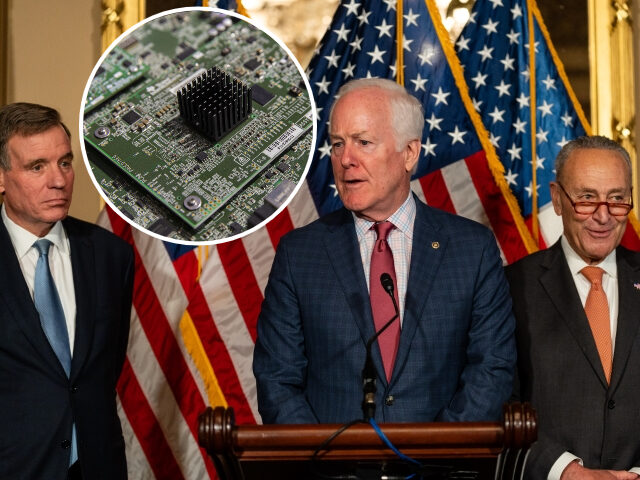The House on Thursday passed legislation aimed at increasing the domestic production of high-tech goods to enhance American competitiveness with China.
The House passed Creating Helpful Incentives to Produce Semiconductors (CHIPS) Act, a $280 billion package that would boost domestic semiconductor chip manufacturing and high-tech research.
The bill was passed 243-187, receiving strong support from Democrats and some support from Republicans.
The legislation would provide:
- $52 billion in financial incentives to the semiconductor industry.
- $80 billion in increased funding to universities through the National Science Foundation (NSF).
- $50 billion in funding for research at the Department of Energy (DOE).
- $1.5 billion to spur mobile broadband development.
- The legislation also has a 25 percent investment tax credit for investments in semiconductor manufacturing.
The legislation sparked disagreement among Republicans, as some expect the bill to boost domestic high-tech manufacturing, while others believe the bill amounts to corporate welfare. The dynamic became more complicated when Senate Republicans gave Democrats enough votes to pass the bill through the upper chamber after Senate Majority Leader Chuck Schumer (D-NY) and Sen. Joe Manchin (D-WV) announced a reconciliation bill that would raise taxes to pay for climate change and enhanced Obamacare subsidies.
Senate Minority Leader Mitch McConnell (R-KY) promised to block the CHIPS legislation if Democrats pursued a reconciliation bill. However, Democrats moved forward after the Senate passed the CHIPS bill, removing any leverage McConnell had.
Despite McConnell’s failed strategy to block a potential reconciliation bill, Republicans in leadership and conservatives opposed the CHIPS Act.
“The Senate passed a bill that took a small, discretionary program and turned it into a $280 billion blank check – including $79 billion in mandatory spending on corporate welfare to be handed out to whomever President Biden wants,” House Republican Leader Kevin McCarthy (R-CA) said on the House floor on Thursday. “For the record, I’m a NO on the Senate CHIPS bill that will come to the floor today. I was a NO last week, I was a NO last night, and I will be the first NO vote on the board later today.”
The House Freedom Caucus said in a statement before the vote:
The Senate’s CHIPS-Plus Act not only adds $79 billion to the deficit, but also is loaded crony capitalist handouts, Green New Deal climate initiatives, and radical ‘woke’ policies. Worse still, it’s passage in the Senate — with the help of 17 Senate Republicans — has opened the door for even more out-of-control spending in the Democrats’ reconciliation deal with $400 billion in spending for liberal priorities and some $700 billion in tax increases. House Freedom Caucus Members have taken an official position opposing the CHIPS-Plus Act, have encouraged Republican leadership to whip against the bill, and now urge all Republicans to stand united against the Democrat agenda.
Rep. Tim Ryan (D-OH) lambasted Republican leadership for whipping against the bill, saying, “July 28, 2022, is gonna be Black Thursday. The day the Republican Party has been hijacked and aligned themselves with Communist China.”
Rep. Michael McCaul (R-TX), the ranking member on the House Foreign Affairs Republican, said it remains important to increase domestic production of high-tech goods as a matter of national security.
“Guess who came out today strongly opposed to the Chips bill. The Chinese Communist Party,” McCaul said.
The bill now goes to President Joe Biden’s desk to sign.
Sean Moran is a congressional reporter for Breitbart News. Follow him on Twitter @SeanMoran3.

COMMENTS
Please let us know if you're having issues with commenting.